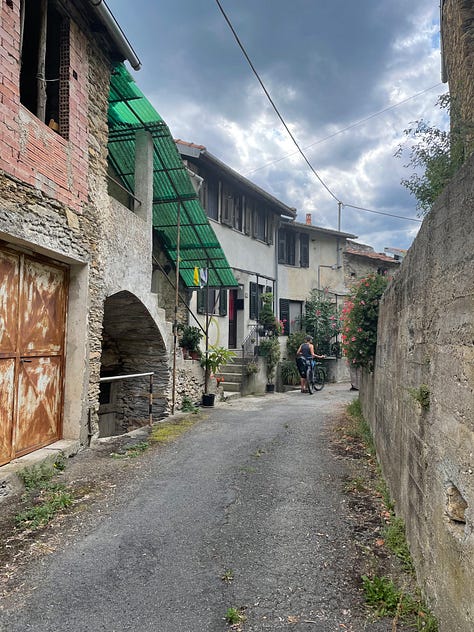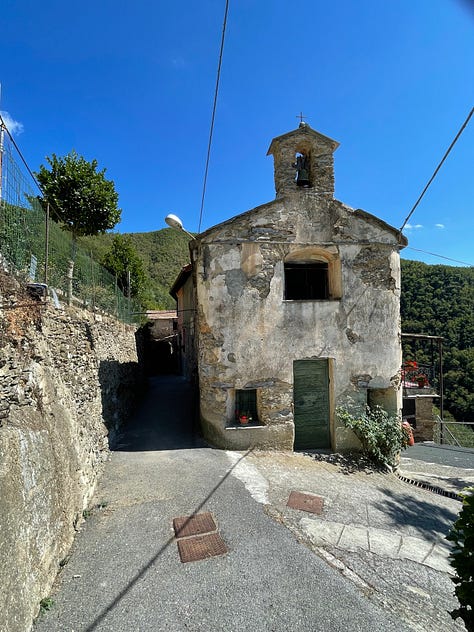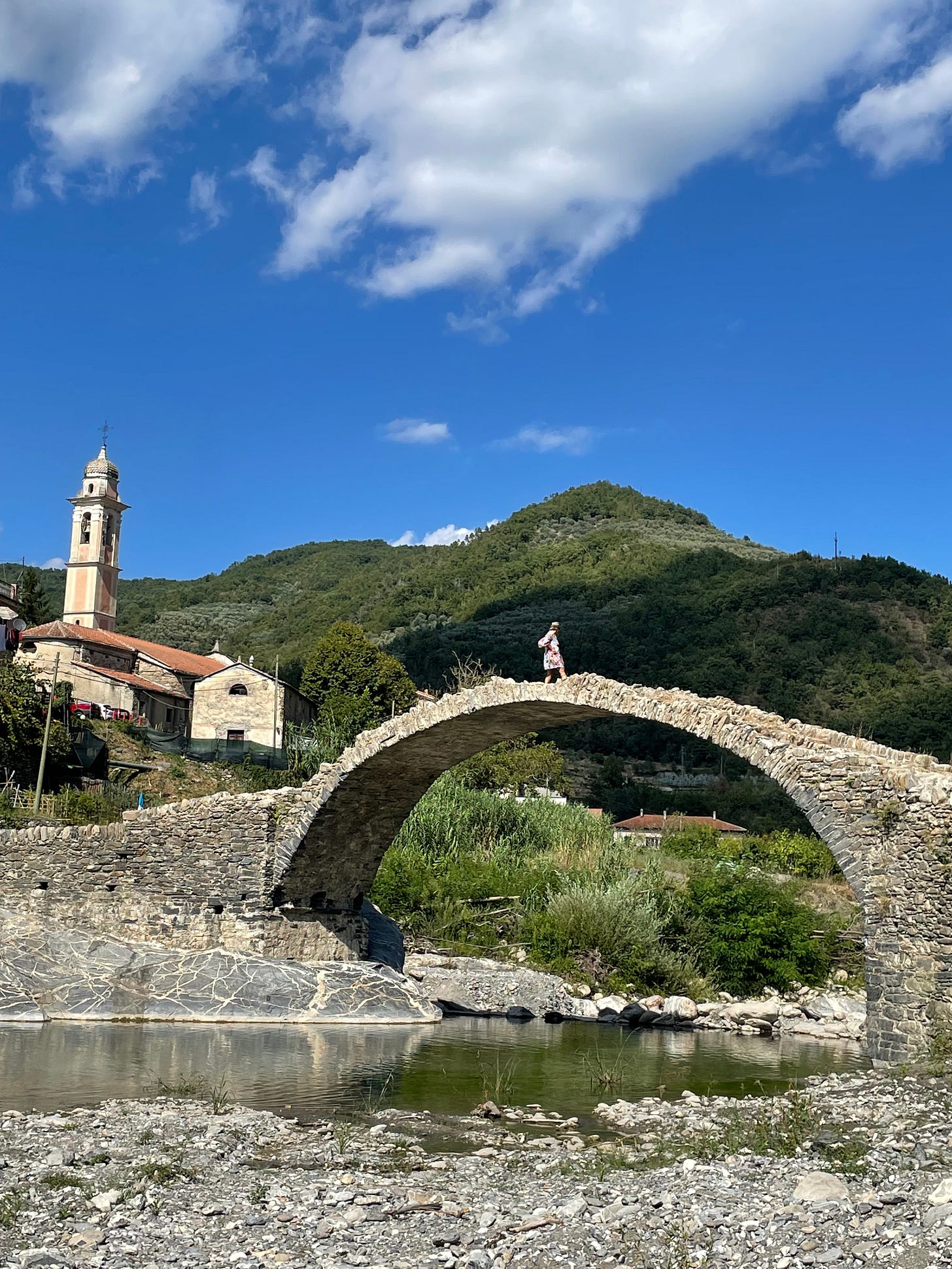My adventure began with a purpose: I was headed to a tiny village perched high in the Ligurian Alps to study the ancient art of Italian Majolica pottery. The artist, who I will refer to as Alisa, was something of a local legend—a master of her craft, secluded from the modern world, living in a place so remote it was said that only the truly dedicated ever made it there. I fancied myself one of those dedicated souls, driven by a desire to immerse myself in the art of ceramics, to learn from a true artisan in a setting that had likely changed little in the last few hundred years.
I drove from my home in Germany, through the crazy tunnels of Switzerland, and onto the mountainous region of Liguria, Italy. From the start, the drive up the mountain had already been a test of my nerves. My BMW station wagon—a behemoth on four wheels, far more suited to the autobahn than a narrow mountain road built for a Fiat —lurched around each hairpin turn leaving me white-knuckled and nauseous. This treacherous ribbon of asphalt felt more like a sick joke than a road that would lead to a pottery paradise. I even dodged a wild boar with an agility I didn’t know I possessed.
By the time I reached the top, I was a cocktail of relief and terror, shaken and stirred. The village—if you could call a collection of ten inhabitants a village—was perched precariously on the apex and was comprised of three churches (for ten people!), a handful of stone houses, and one hermit monk who, I was told, walked and blessed the village each morning. During my stay, I witnessed said monk and his walk through the village. However, I question whether his “blessing” was a holy duty or just a convenient excuse to spy on his neighbors. He often stopped and stared longer than needed for a quick “may peace be with you”.
My accommodation was in a quaint, traditional stone building. It was the kind of village you’d imagine an artist might retreat to for inspiration but could have also been one of those “buy an Italian villa for $1” places. Ms. Patrizia, the owner, greeted me at the door with a warm but slightly wild-eyed grin.
Ms. Patrizia was a sight to behold—a character straight out of a Fellini film. Her black hair was piled high on her head in a towering beehive, held together by a network of clips and bobby-pins. Her ill-fitting dentures clicked audibly as she spoke, lending a strange rhythm to her words, like a percussion instrument accompanying her rapid-fire Italian. She wore a bedazzled shirt paired with a long, flowing peasant skirt that swished around her ankles as she moved, a strange combination of rural simplicity and glittering excess.
I wasn't sure if she was welcoming me or warning me about something, but her enthusiasm was undeniable. She showed me to my flat which was a tiny but charming space, filled with old-world character. The walls were thick stone, giving it a cool, earthy feel, and the wooden beams above added a rustic touch. The bed, tucked into a cozy nook, was covered in an old hand-stitched quilt that looked like it had been passed down from bisnonna to nonna to mamma. A small window in the kitchenette overlooked the village and the endless expanse of mountains beyond.
I dropped my bags and then immediately thought, “FOOD!”. The drive had been so harrowing that I’d forgotten to stop for groceries—a rookie mistake when staying in a place where the closest supermarket involved a 30-minute drive back down the roller coaster of a mountain pass.
Determined to rectify this, I jumped back into my car and headed down the mountain, only to realize, at the first hairpin turn, that the road and my front wheels had had a falling out. The car lurched, the tires spun, and I found myself quite literally teetering on the edge of disaster. There was no way I could budge the car alone, so I trudged back to the village, my pride trailing behind me like an unruly dog. I explained in broken Italian my predicament to the first person I encountered. “La mia machina e’ ferita!”. Yes, friends, I said, “My car is hurt!”. The news of a damsel in distress quickly spread.
The entire male population of the village—six, by my count—turned out to help. I had the feeling that this kind of excitement didn’t happen much in the village. The men-folk gathered around the car as the women-folk wrang their hands in exasperation at the sight of my car dangling off the road. The gents jabbered away in animated Italian, pointing at the car, the road, and occasionally at me with what I could only assume were suggestions or maybe curses. Their hands moved in a symphony of gestures—wild, exaggerated, and full of passion—fingers pinched together and flicked toward the sky, arms waving as if conducting an invisible orchestra of frustration and determination.
Their first plan—picking up the car and moving it—was a spectacular failure. The men grunted and pushed but the BMW remained resolutely in place. The next plan involved a lot of shouting and me behind the wheel revving the engine while they pushed. No surprise, this accomplished nothing except a possible back injury to one fellow.
An intense discussion ensued. Suddenly all the men disappeared only to return with planks of wood. I was curious about this new strategy. They worked furiously tucking wood here and there around the car. I reassumed my place behind the wheel, car in reverse, and foot on the gas. With a combination of brute force, Italian ingenuity, and what I could only assume was divine intervention from the monk, they managed to lever the car back onto the road. The cheer that went up was worthy of a World Cup win, and I was so relieved I let out a hoot and a shriek of “GRAZIE! GRAZIE! GRAZIE!”.
Amazingly, with no damage to my car, I drove into town, returning with a universal peace offering: wine. The townspeople accepted it graciously, though I couldn’t shake the feeling that they were imagining the next automotive disaster I might conjure up. For the rest of my stay, every time I even glanced at the car, I received the kind of looks usually reserved for people who suggest pineapple on pizza. And whenever I drove it, I could feel the collective village holding its breath, waiting for the next chapter in my ongoing saga of how not to drive in Italy.









.





Driving abroad is one of the most stressful situations! I love that you and your car will be the talk of the town for a long while!